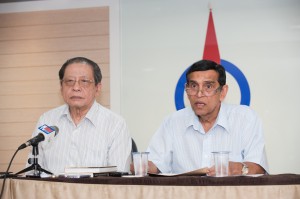Education Minister, Datuk Seri Mahdzir Khalid should ensure that Malaysian taxpayers do not have to pay for the RM3 million mistake in reprint of Year Six History textbook which showed Malacca in the east coast above Terengganu.
It is shocking as to how such a basic mistake, which should not be made under any circumstances, could be made despite the various levels of checks and counter-checks, from the choice of the author to the writing of the text, including the title to the diagrams and content to the last page.
Clearly, the whole system of checks and counter-checks have broken down in the education ministry, which does not reflect well on the professionalism of the Education Ministry, departments and agencies like the Dewan Bahasa dan Pustaka (DBP) delegated with such tasks.
The DBP director general Datuk Dr. Awang Sariyan has said that reprinting the history text would cost RM3 million. Continue reading “The Education Minister should ensure that Malaysian taxpayers do not have to pay for RM3 million mistake in reprint of Year Six History textbook which showed Malacca in the east coast above Terengganu”

